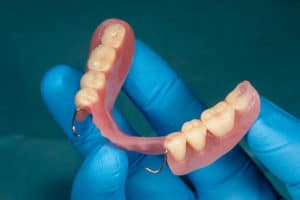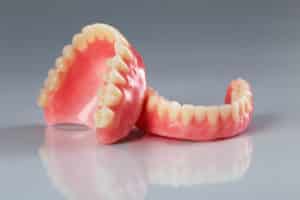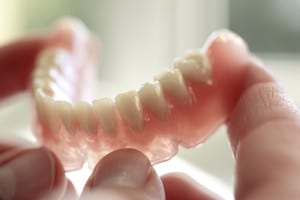What Are Dentures?
A denture, what is also commonly called as false teeth, are artificial devices that are fabricated to take the place of missing teeth in the patient’s mouth. In Edison, Metuchen, & South Plainfield, NJ, dentists often give their patients practical design options that would best fit their needs and their lifestyle. Dentures are typically supported by the tissues within the oral cavity and may be attached to either the mandibular or the maxillary arch of the mouth, depending on where the gaps created by the missing teeth are located.
What Are The Advantages Of Using A Denture?
For patients who know the discomfort and inconvenience caused by missing teeth, dentures will be able to help them improve their chewing ability and allow them to enjoy their food more. It will also help restore a more natural appearance to the patient’s face because it replaces the missing support that the teeth normally give the lips and the cheeks. Patients are also able to speak and pronounce their words better. Most importantly, wearing dentures will boost the patient’s self-esteem because it gives back his confidence to interact with other people without having to worry about missing teeth.
Types Of Dentures
Depending on the patient’s personal requirements, behavior, and overall way of life, different types of dentures could be recommended by the dentist for their use:
Partial Dentures
Partial dentures are recommended for people who have some missing teeth on the mandibular or maxillary arch of the mouth. Removable partial dentures are typically made up of fabricated teeth that are attached to a pink plastic base and it is held securely in place by metal clasps that can attach to the existing teeth. On the other hand, fixed partial dentures are also referred to as the “crown and bridge dentures” and are often cemented into place to maintain the appearance of a complete set of teeth.

Full Dentures
Full dentures are those that are used to replace all of the missing teeth on a particular arch in the patient’s mouth. The prosthetic teeth used in this type of denture are attached to a gum-colored base that is supported by a metal framework to help keep the denture snugly in place.

How Do I Take Care Of My Dentures?
Always handle your dentures with care because they can be easily breakable otherwise. Just like natural teeth, clean your dentures regularly using a soft-bristled brush and a denture cleaning solution to remove food particles and plaque buildup on the surfaces. For removable dentures, put the prosthetic in a container with a soaking solution or tepid water when it is not being used. Consult your dentist for best care practices that you could use to take care of your dentures in order to maintain its functionality for a longer period of time.
Can I Sleep In My Dentures?
You shouldn’t sleep overnight in your dentures. Naps? Fine. Overnight. Not. You should remove your dentures at night, as this gives your gums and jawbone time to relax from the pressure of the denture during the day. Also, this is the time to clean your dentures and store them in water. If you fall asleep all night with them in, that is fine occasionally, but the next morning they should be removed and properly cleaned, along with your gums and overall mouth.
Should I Avoid Any Foods With Dentures? Can I Eat Normally?
One of the biggest adjustments for many of our Gentle Dental patients receiving dentures for the first time is what and how to eat. The areas above and below your dentures are prime spots for food to get stuck. Biting and chewing hard foods can cause your dentures to slip. To avoid these problems, it’s wise to adjust your diet to a degree.

You’ll have to transition in the beginning to adjust to chewing and biting. Your gums will probably still be a little sore from any dental work we may have done to prepare them. You’ll start with soft foods: hot cereals, applesauce, pudding, Jell-O, mashed potatoes, thoroughly cooked vegetables, yogurt, and the like. With hot liquids you’ll need to be careful. Dentures insulate your mouth, making it less sensitive to heat.
After a few days you’ll transition to solid foods. At first, you’ll have to cut them into small pieces, so you don’t have to do excessive chewing. Move on to these foods: cooked rice, pasta, soup with cooked vegetables and soft meats, soft bread, skin-free fish, baked beans, and similar foods.
Once you get comfortable with those foods, you’ll be good to go. Eventually, you’ll be able to eat most of the foods you’re used to eating. Try to chew evenly on both sides of your mouth. There are some foods you should avoid or eat only occasionally. You can guess what they are, as they fit into these categories:
- Sticky foods — Peanut butter, caramel, gummy candies, etc. These sticky foods can pull your dentures out of place, allowing food to get underneath the dentures and irritate your gums.
- Foods with small pieces — Popcorn kernels, sesame seeds on buns, shelled nuts or seeds, etc. These foods with pieces that natural teeth cannot grind or chew easily are a problem for denture wearers.
- Hard foods — Nuts, popcorn, apples, carrot sticks, corn on the cob, etc. Hard foods require your jaw and your dentures to apply uneven pressure to chew. This can damage or dislodge your dentures.
- Tough meats — Pork chops, steak, ribs, etc. Foods that require many bites to tenderize them place unnecessary stress on your dentures and the gums beneath. Too much chewing and grinding create sore spots where dentures and gums meet.

How Long Will My Dentures Last?
Complete dentures last from five to seven years on average. It’s not the false teeth that degrade; the gum tissue and the jawbone beneath the dentures change. These changes dictate relining, rebasing, or remaking the dentures. We will usually keep the artificial teeth on top of the dentures but will have the base that sits on the gums re-formed to new parameters.
Will I Experience Any Pain Wearing Dentures?
When our patients are first fitted for their dentures, they usually experience minor irritation. This is simply the adjustment of your gums to the dentures. This period varies among patients. If you’ve had previous dentures, your new set may cause some pain for a little longer period, as your gums need to adjust to the new shape and tighter fit. If we had to remove teeth, those sites may be painful or uncomfortable for a few weeks. Having our dentists adjust your dentures as you move through the healing process is important to your comfort moving forward,

Will Dentures Change My Facial Appearance?
That depends. If you’ve been missing all or most of your teeth for a longer period of time, the odds are your jawbone has resorbed, or shrunk, to some degree. This causes your face to collapse, both vertically and horizontally. That’s why people who have been missing their teeth for a long time look as if their bottom jaw has moved backward.
Custom-fit dentures from the experienced team at Gentle Dental can reverse that collapsed appearance. Your dentures add length back to your mouth so that your nose and chin no longer are as close together. Dentures also support your lips and cheeks, reducing some of your facial wrinkles and making you look younger again.
So, yes, dentures can change your facial appearance, and they do so in a fully positive way.
See What Our Patients Have To Say…
“I came into gentle dental care was a problem with my dentures from another dentist. They took the time to see me, explain what was wrong with the dentures, and offer suggestions on how to make things right. Everyone was extremely helpful and friendly.“ – Thomas P.
“This is the absoluteBEST dental practice around. I can’t really say much more except for that everyone should go to Gentle Dental.” – Jerry VC.
Source: Google
Are There Any Risks Involved With Wearing Dentures?
There really aren’t any risks, per se, but there are consequences to wearing full dentures. Whenever you have full dentures, your jawbone doesn’t receive any bite force energy, as it does when chewing with natural teeth. This energy flows down through the teeth into the jawbone beneath. It is this energy that keeps the jawbone healthy, signaling it to shed old bone cells and replace them with new jawbone cells. When you’ve lost all of your teeth, whether or not you wear dentures, the jawbone no longer receives this energy and it deteriorates.
That is one reason why we love implant-supported dentures at Gentle Dental. By placing four dental implants on each arch, we can anchor the full-arch denture on top and bottom to the implants. This not only stabilizes your dentures, but the implants send that bite force energy down into the jawbone, just as your natural teeth did, and this keeps the jawbone from deteriorating to the same degree.

Otherwise, the only issue with dentures is due to poor maintenance by the wearer. If you don’t properly clean your dentures and the gums they sit on, problems can develop with your gums. This doesn’t have to happen, however; it’s simply a result of poor home hygiene.
Schedule A Consultation Today!
If you’re interested in learning more about dentures please contact us for a consultation with one of our dentists at 732.549.5660 or fill out our contact us form. We will discuss your needs and concerns, and determine your best course of action.



